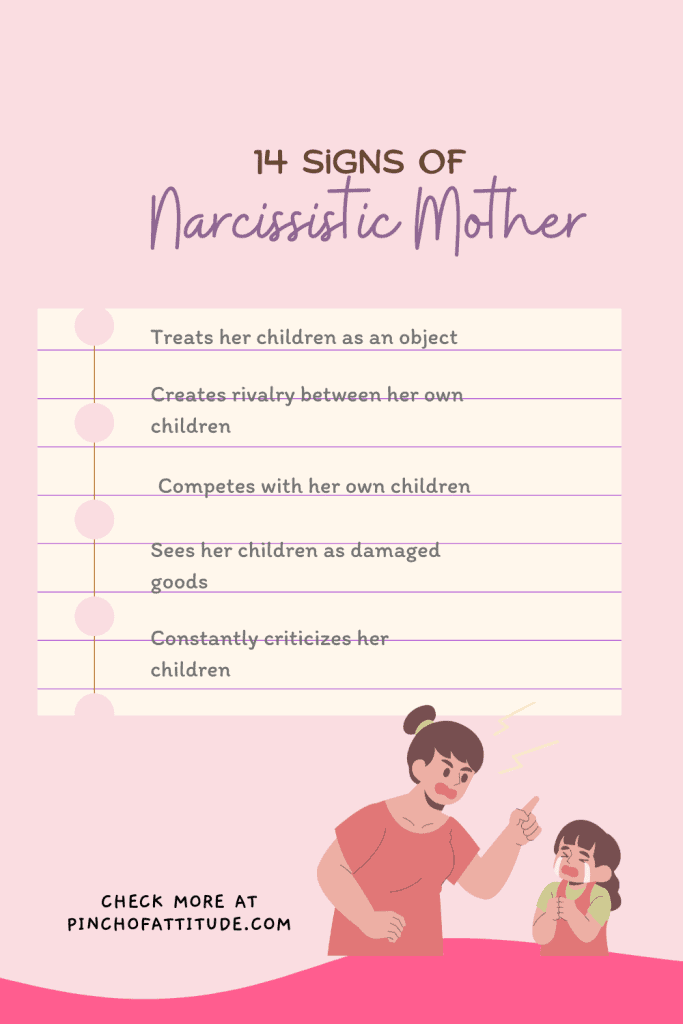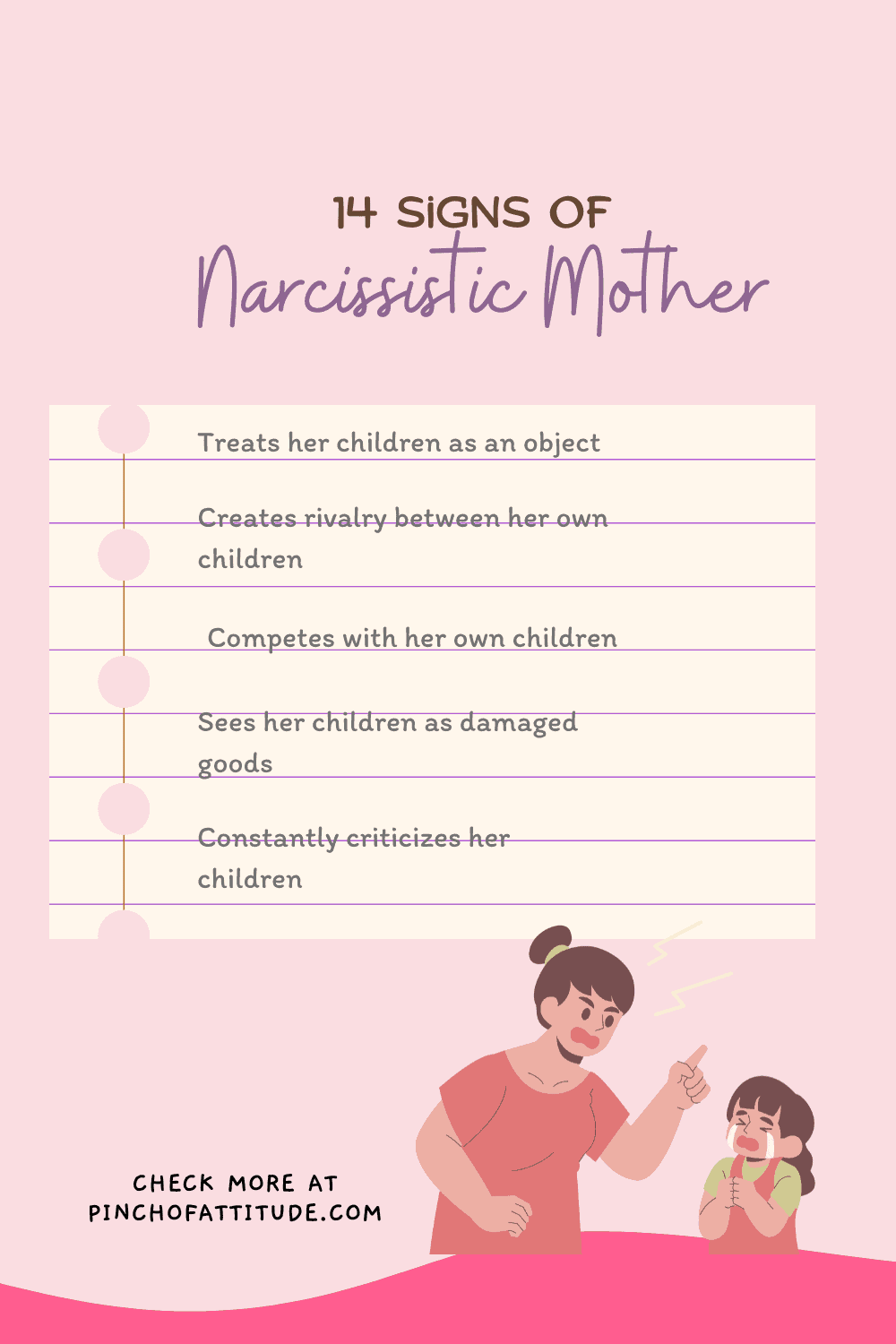Growing up with a narcissistic mother, whether she’s in her prime or a narcissistic elderly mother, can feel like navigating a never-ending emotional maze.
And I know this all too well, as I’ve spent 30 years trying to understand and cope with the challenges that come with having a narcissistic mom.
This journey has taught me to recognize the telltale signs of a narcissistic mother, understand the profound effects it can have on one’s life, and discover what strategies work in dealing with one.
Below, I will share a glimpse into my own personal experiences to hopefully help others in similar situations.
- A narcissistic mother exhibits self-centered behavior, manipulating and controlling her children to meet her own needs.
- The effects of a narcissistic mother on her children can be long-lasting. These may include low self-esteem, insecurity, and difficulty forming healthy relationships.
- To find peace, learn to set boundaries, prioritize self-care, and seek support. Consider limited or no contact when necessary.
Table of Contents
What Is a Narcissist Mother?
A narcissist mother is one who prioritizes her own needs, desires, and ego above her children’s well-being. There are various types of narcissistic mothers, each displaying unique patterns of behavior. However, common traits include manipulative, controlling behaviors and a lack of empathy towards her children.
Either way, her narcissism manifests in an excessive and often self-centered focus on her own needs, desires, and feelings, to the detriment of her children.
She may have a constant need for admiration and attention, is manipulative, and shows a lack of empathy with her children’s emotions or experiences.
Narcissistic mothers view their children as extensions of themselves.
They may be critical, demanding, and controlling, while at the same time, they can swing between idealizing and devaluing their children.
This unpredictable and emotionally turbulent environment can leave a lasting impact on their children.
You’ll find children of narcissistic mothers often have problems with their self-esteem, emotional well-being, and ability to form healthy relationships.
14 Signs of a Narcissistic Mother

I know from my own experience how confusing it can be growing up with a narcissistic mother.
It isn’t easy, so if you suspect your mother is a narcissistic individual, I would recommend you watch out for these signs and act accordingly:
- Treats her children as an object: Even well into adulthood, a narcissistic mother continues to view her children as tools for fulfilling her own needs. She neglects their individuality, feelings, and desires.
- Creates rivalry between her own children: A narcissistic mother destroys sibling relationships by pitting her children against each other. She fosters a sense of competition that can lead to lasting sibling rivalry and resentment.
- Competes with her own children: Instead of nurturing her children’s growth, she’s self-absorbed and sees them as competition. She may undermine their accomplishments to maintain her own superiority.
- Gives the silent treatment when she doesn’t get what she wants: When her desires aren’t met, she employs the silent treatment, leaving her children feeling rejected and emotionally abandoned.
- Sees her children as damaged goods: A mother with narcissistic tendencies may constantly belittle her children. She convinces them they are inherently flawed, which can lead to deep-seated self-esteem issues.
- Pretends to be ill (Emotional Münchausen): Some narcissistic mothers feign illnesses or crises to gain sympathy and attention, manipulating their children into taking care of them.
- Constantly criticizes her children: She seldom misses an opportunity to criticize her children. As such, children of narcissistic parents may struggle with finding self-confidence and self-worth.
- Loves to play the victim: Playing the victim is a common tactic for narcissists. You’ll find a narcissistic mom portraying herself as the one who suffers while shifting blame onto her children.
- Treats her kids nicely only in public: She maintains a facade of a loving mother in front of others, but behind closed doors, her behavior can turn cruel.
- Obsessed with maintaining good appearances: A narcissistic mother places great importance on the family’s image, sometimes at the expense of her children’s true feelings and needs.
- Hates any criticism of her: She cannot tolerate criticism. She’s always angry or defensive when confronted with her faults or mistakes.
- Doesn’t care about anyone else’s needs: Her needs and desires always take precedence. As such, it’s challenging for her to genuinely consider the needs of her children.
- Wants everyone to admire her: She craves admiration and adoration from everyone around her. She also expects her children to constantly praise and validate her.
- Has very unrealistic expectations for her children: A narcissistic mother often imposes unattainable standards and goals on her children, leading to constant disappointment and pressure in their lives.
What Is the Effect of a Narcissistic Mother on Her Children?
The effect of a narcissistic mother on her children is profound, often leading to long-lasting emotional and psychological consequences.
You can typically spot one who characterized by her insatiable need for admiration and a notable lack of empathy, can deeply affect her children’s sense of self-worth and their ability to navigate relationships.
Unfortunately, she’ll constantly criticize you for almost everything which can make you feel that you’ll never measure up resulting in severe damage to your self-esteem.
I personally understand the depth of this pain as I went through it myself growing up. It’s like living under a cloud of doubt, always questioning your worth and capabilities because of the unrealistic standards set by your mother.
This constant scrutiny can manifest as a persistent insecurity. You may find it challenging to trust not just others, but also yourself.
I had to invest significant time and energy to overcome these insecurities and learn to trust my own judgment.
Another critical area affected is the ability to form and maintain healthy relationships.
If you’re a daughter of a narcissistic mother, you might often struggle to stay in a healthy relationship, as you might not have experienced a loving, supportive maternal bond. This absence of genuine warmth and care can cast a shadow over friendships, romantic partnerships, and even professional relationships.
The emotional turmoil is another challenging aspect, for me, it was hard to overcome. A narcissistic mother’s unpredictable oscillation between praise and criticism, between idealization and devaluation, can leave you, especially daughters, emotionally scarred.
I recall the countless nights I spent trying to make sense of the conflicting emotions I felt, and it has been an ongoing journey for me to manage and understand these feelings.
Growing up under such a mother’s influence, you might find yourself constantly seeking external validation.
I often felt this void, looking for affirmation outside because I never received it at home. This constant search can sometimes lead to a lack of self-assertion. It becomes challenging to express my needs, desires, and boundaries, given the years of being overshadowed and manipulated.
On top of that, the unpredictability of a narcissistic mother can instill a perpetual fear of abandonment in her children.
You may find this fear influencing various aspects of your life, from your friendships to even career choices. It’s like walking on a tightrope, where you’re trying to find balance while battling perfectionism, self-doubt, and an innate difficulty in prioritizing yourself.
In essence, a narcissistic mother can shape your worldview, often not for the better. The journey to healing and rediscovering yourself, though challenging, is important for those affected.
Factors You Might Be Raised by a Narcissistic Mother
Growing up under the shadow of a narcissistic mother leaves indelible marks.
I, too, felt these pressures and their aftermath, and recognizing these signs can be the first step toward understanding and healing.
You might consistently grapple with low self-esteem. Continuous criticism and impossible standards can erode your confidence. I often felt never good enough, with every achievement overshadowed by a looming inadequacy.
Possessing a powerful inner critic is another sign. The constant critiques from your mother can result in a relentless voice in your head, constantly judging every action. My days were dominated by self-doubt, with every decision met with scrutiny.
If you’re being a perfectionist might be a familiar trait. This isn’t about excellence but an ingrained need to meet towering expectations. I recall sleepless nights, tormented by minor errors, always feeling a step behind.
Chronic shame could weigh heavily on you. Never meeting your mother’s expectations, you might feel an inherent flaw in your being. I felt perpetually wanting, struggling to find validation.
You might be overly sensitive to criticism. Past wounds make even well-intentioned feedback sting. Friends’ harmless remarks often felt like sharp jabs to me, triggering defensive reactions.
An intense sensitivity to rejection could dominate your relationships. Fears, rooted in past experiences, might make it hard to trust. I found it challenging to form deep connections, always wary of them ending abruptly.
You might often find yourself in one-sided relationships. Accustomed to your mother’s needs overshadowing yours, you may unknowingly repeat this pattern. I constantly put others before me, struggling to prioritize my own needs.
Insecure attachment patterns could make forming healthy relationships challenging. It took me years to understand my issues with trust and intimacy, a direct result of an unstable foundation.
Mental health struggles, particularly anxiety and depression, might be a constant battle. The emotional toll of your upbringing can manifest in persistent feelings of sadness and unease. I experienced unexplained bouts of melancholy, remnants of past traumas.
Quick anger might plague your relationships. Unresolved anger from childhood can surface in volatile reactions. I found it hard to manage my emotions, with anger often erupting unexpectedly.
Self-sabotage might be a recurring theme. Despite successes, you might unconsciously hinder your happiness. I noticed patterns where I’d push away the very things I desired, a protective mechanism rooted in fear.
Lastly, a diminished sense of self could be evident. Prioritizing your mother’s needs might have distanced you from your true self. It took introspection for me to reconnect with who I truly was, beyond the expectations imposed on me.
Recognizing these signs is very important. It’s the first step in understanding the impact of a narcissistic upbringing and seeking a path to healing for you.
Things My Narcissistic Mothers Said to Me and Why?

My narcissistic mother said a lot of hurtful things to me whenever she had the chance for various reasons, reflecting her own insecurities and self-centeredness.
She used these phrases to maintain dominance and manipulate me and other family members, often driven by her own need for control, attention, and validation.
Let me break down some of the things my toxic mother loved to say to me and why:
- You’re never good enough. This is an example of gaslighting designed to chip away at your self-worth. It reinforces your narcissistic mother’s control, making you feel dependent and perpetually unsure of your worth.
- You’re just like (negative comparison). When your mother is a narcissist, saying this is like a targeted missile at your individuality. It’s designed to make you feel smaller and less important in your own skin.
- I sacrifice everything for you. This is a classic example of a narcissistic mother guilt trip meant to make you feel guilty. Such behavior ensures you remain obligated and indebted to your mother.
- You’re so ungrateful. This expression is a calculated tactic used to undermine your ability to voice your needs and establish personal boundaries.
- You’re the reason for my problems. By placing the blame on you, your narcissistic mother attempts to absolve herself of responsibility for her mistakes.
- You’ll never make it on your own. This is a tactic aimed at making you doubt your ability to be self-sufficient and self-reliant.
- I wish you were never born. This emotionally manipulative statement instills guilt and insecurity. It can make any child feel unworthy and burdensome.
- You’re too sensitive. By invalidating your emotions and experiences, your narcissistic mother is able to deflect responsibility for her actions.
- You owe me for everything I’ve done. This is aimed at reinforcing your sense of obligation and guilt. It is used to make you feel indebted and beholden to her for any assistance or care provided.
- I’m the real victim here. Your narc mom says this to divert attention from her own behavior. It portrays her as the one who’s suffering, thereby deflecting focus away from her actions and their impact on others.
- You’ll never find anyone who loves you like I do. This statement is designed to make you feel dependent on her love. She wants you to believe that no one else will ever care for you in the same way, cultivating fear of rejection and isolation.
- You’re making things up. Denying her reality helps her maintain control. It makes you question your own perceptions and experiences, keeping you under her influence.
- I know what’s best for you. By invalidating your autonomy and decisions, she’s able to assert control and undermine your confidence in making your own choices.
- You’re just like your (negative trait) father. Her goal is often to alienate you from the other parent and stoke feelings of insecurity. She uses this to create a divide between you and your other parent while undermining your self-confidence.
- You can’t do anything without me. She wants to keep you dependent and under her influence. This statement is meant to instill a sense of helplessness and control over your decisions and actions.
How to Handle a Narcissistic Mother and Find Peace?
Dealing with a narcissistic mother can be a challenging and emotionally taxing journey.
But I also know from experience that finding peace is possible by implementing some healthy coping strategies, such as:
Set Boundaries
Establish clear boundaries by defining what behavior you will and won’t tolerate.
Communicate these boundaries to your mother and consistently enforce them. This helps protect your well-being and assert your autonomy.
Practice Self-Care
Prioritize self-care to nurture your emotional and mental health. It’s essential to ensure you have the emotional resources to cope with her narcissistic behavior.
Regularly engage in activities that bring you joy, relaxation, and fulfillment.
Seek Support
Connect with trusted friends, a therapist, or support groups who can offer guidance, empathy, and understanding.
Sharing your experiences with those who support you emotionally can be immensely validating and reassuring.
Maintain Perspective
Remember that your mother’s behavior is a reflection of her issues, not your worth.
Work on detaching from her manipulation and recognizing that her behavior doesn’t define your value as a person.
Consider Limited Contact or No Contact
In extreme cases, you may need to limit or cut off contact with your narcissistic mother to protect your mental and emotional well-being.
This can be a difficult decision, but it may be necessary for your peace and self-preservation.
What Not to Do When Dealing With a Narcissistic Mother?
Dealing with a narcissistic mother can be an arduous journey, but it’s crucial to understand what not to do when confronting this challenging situation.
Here are five things you should avoid when dealing with a narcissistic mother, as they can be counterproductive to your emotional well-being and growth:
Don’t Ignore the Narcissistic Traits
Ignoring or denying the narcissistic traits of your mother can do more harm than good.
Acknowledge the reality of her behavior and its impact on you, as this is the first step toward addressing the situation in a healthy way.
Don’t Blame Yourself
It’s important to recognize that you are not the cause of your mother’s narcissistic characteristics or her NPD, and it’s not your fault.
Blaming yourself for her behavior only perpetuates feelings of guilt and inadequacy.
Don’t Sacrifice Your Needs
Avoid sacrificing your own needs and well-being to meet your mother’s demands.
Prioritize your emotional health, even if it means setting boundaries or seeking distance when necessary.
Don’t Engage in Abusive Dynamics
Refrain from engaging in abusive dynamics or responding to manipulation with aggression or anger.
It’s important to maintain your emotional integrity and avoid getting drawn into confrontations that may further harm your well-being.
Don’t Rush the Healing Process
Healing from the effects of a narcissistic mother is a journey that requires time and patience.
Avoid rushing the process or expecting immediate results. You can begin your healing journey when you’re ready, taking small steps to reclaim your emotional health.
Related Posts:
- 25 Characteristics of a Narcissistic Mother: You’re Not Alone
- How to Deal With a Narcissist Mother: I Overcame, Let Me Show You How
- 13 Tips on How I Deal With My Narcissistic Mother Guilt Trip
- Cut Off Narcissistic Mother: How I Finally Cut Ties With Her After 30 Years of Hell
- 13 Challenges I Had to Overcome While Growing Up With a Narcissistic Mother
Frequently Asked Questions
What is a narcissistic mother, and how does she manifest her behavior towards her children?
A narcissistic mother is a person who consistently exhibits self-centered behaviors, often prioritizing her needs, desires, and emotions over those of her children.
What are the effects of having a narcissistic mother on her daughters?
A narcissistic mother can cause her daughters to struggle with self-esteem, exhibit perfectionism, or face difficulty in forming healthy relationships.
How can you recognize if you were raised by a narcissistic mother?
If you were raised by a narcissistic mother, you might have grown up walking on eggshells, experiencing mental health issues, and feeling a sense of unease with every decision.
How can you handle a narcissistic mother and find peace in your life?
To address the challenges of living with a narcissistic mother and heal your inner child, make sure you establish clear boundaries, prioritize self-care, and seek support through therapies like CBT.
What should you avoid when dealing with a narcissistic mother?
Avoid dismissing or rationalizing even one narcissistic symptom as it can perpetuate emotionally abusive dynamics. Instead, recognize the signs and prioritize your well-being.




